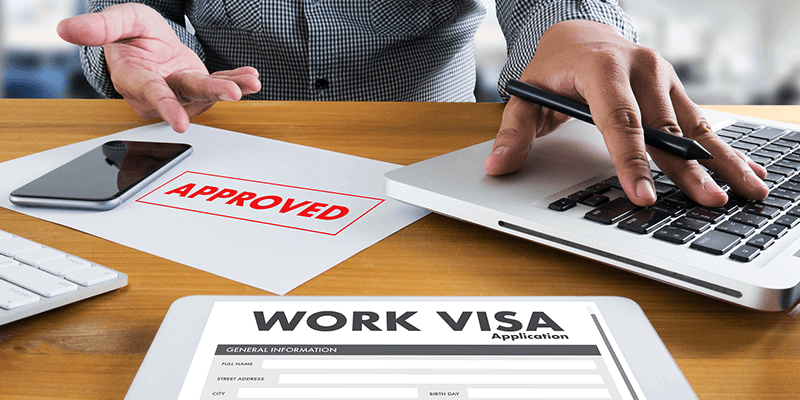
Updated on: October 17, 2022
Digital Nomads and Visas: What You Need to Know
Living abroad may be your dream. Living abroad and earning a living is where dream meets reality. Unless you’re independently wealthy, if you’re traveling the world, you need to make a living to pay for your travel.
And even though travel plans have been cancelled or postponed due to the pandemic, the hope is that things will return to “normal” in the near future and borders will open again. This also means that blending travel with career success through a fully remote job will soon again be a possibility.
You used to have to work for an international company and work your way up to an internationally based position in order to both work and live abroad. But now, thanks to the internet, it’s possible to live and work anywhere. Digital nomads pack up and move whenever the spirit decides it’s time to move on. And, with a work-from-anywhere job, they can take their job with them, too.
The thing is, packing up and moving from one country to another and popping open the laptop to work isn’t so simple.
Maintaining a legal status as a digital nomad isn’t easy. However, it is fast becoming an important part of the digital nomad lifestyle. It may not be the most fun part of a digital nomad’s life, but you should take the appropriate steps to make sure you are legal when you live and work abroad, that way you can enjoy your travels and international work experience.
What Is a Visa (And Why You Need One)?
There are plenty of things to think about as a digital nomad. Passports, taxes, and internet speed top the list. However, you should also add “visa” to your list. Not the credit card, though that is something to think about. A visa is the permission a country gives you to stay in their county.
Some countries have agreements with each other that allow their citizens to visit without visas. However, in countries that require visas, you can’t enter without one. And if you overstay your visa (or somehow manage to get in without one), you will be in legal trouble.
What’s tricky is that not every country requires you to have a visa in certain circumstances but does require it in others. It’s important to distinguish between the types of visas, and when you do and do not need one before you plan your itinerary.
Tourist Visas
Let’s start with a common reason to travel: tourism. Most people travel to other countries for “leisure reasons,” like a vacation. In most cases, you won’t need a visa if you’re traveling for vacation.
For example, U.S. citizens that visit Europe can go to 26 European countries without ever needing a visa. However, you can’t stay for longer than 90 days. In some countries, say, China, you do need a tourist visa.
When you need a visa, you should apply for the tourist visa well in advance of your trip (as much as four months in advance). And when you apply, you have to prove that you’ve got a return ticket to your home country (or that you’re leaving the country by the time your visa is up).
Working Visas
Then there are working visas. Keep in mind that a working visa is for when you are a temporary worker, say a seasonal worker at a water park for the summer. If you are a permanent employee, your employer needs to sponsor your visa, and that’s a different process. Also, if you are visiting a country for a quick business trip, you likely don’t need a business visa, but check before you go.
The requirements to get a working visa vary by country, but in nearly all cases, you’ll need to provide a lot of evidence that you have a job before your visit. For example, to get a working visa for the EU, you need a valid passport with at least two blank pages, a round trip ticket proving you will leave the country, proof of medical insurance, proof of residency, proof of employment — and that’s just the beginning.
Digital Nomads and Visas
This means that working for yourself as a freelancing digital nomad may not be enough to get a working visa. This also means that when you arrive at customs and they ask you the purpose of your visit, you’re faced with a common digital nomad dilemma.
If you tell the truth, there’s a chance they won’t let you in the country. If you lie and get caught, you’re in trouble. And while you might be thinking, “Really, what are the odds I get caught,” know that it has happened.
In 2014, digital nomads in Chiang Mai were detained when police raided a popular co-working space. Those nomads were released, and no charges were filed. And in 2018, Thai police detained 166 Chinese nationals who were trading stocks while in the country on tourist visas. Again, no charges were filed.
While the authorities took no action in either case, that doesn’t mean these nomads weren’t engaged in illegal activities. In both cases, the police issued statements explaining they had no authority over the situations.
How to Stay Legal as a Digital Nomad
Digital nomadism isn’t going anywhere, even though most countries are still trying to catch up with the new way to live and work anywhere. However, visas for digital nomads aren’t widespread yet. But that doesn’t mean you can’t find them.
Before you assume a visa will cover you, investigate the details carefully. Certain visas are touted as “great for digital nomads.” However, once you dig deeper, you may discover they aren’t so great. Many times these visas specifically say that you cannot work–even as a freelancer.
Visas That Aren’t Great for Digital Nomads
Mexico, Australia, and Estonia are often mentioned as great places for digital nomads to get visas. While these can be fantastic visas for traditional business, they are not so fantastic for digital nomads.
- Mexico’s temporary resident visa is good for one year. However, you cannot work, and you have to prove you’re economically independent.
- Australia has the Working Holiday Visa. This visa allows people that vacation in Australia to work during their vacation. However, you can’t work for the same employer for more than six months — including when you’re self-employed. There are ways around that condition, but they can be tricky to navigate.
- Estonia has created an “e-residency.” It’s important to note that gaining e-residency in Estonia is not a visa or residence permit. What e-residency gives you is the ability to establish your company in Estonia, but live and work wherever you want (within the European Union).
The Czech Republic and the Schengen Visa (which includes 26 countries in Europe) are also often mentioned as great ways to be a digital nomad in Europe. However, it is illegal to work while on the Schengen Visa (something they emphasize on their website). And while the Czech Republic offers a business visa, it’s not easy to get when you’re a freelancer.
Visas That Are Better for Digital Nomads
Fortunately, two countries have recognized that self-employed freelancers can add value to the local economy. These countries offer visas for digital nomads (and other types of freelancers, too).
Germany
Germany has two kinds of visas for the self-employed. The first one is the residence permit. This visa, however, is for people that are starting (or managing) a business located in Germany.
The second visa is for freelancers. There’s a wide range of occupations that Germany considers freelance, including:
- Artists
- Writers
- Language teachers
- Self-employed doctors, engineers, auditors, or architects
However, getting this visa isn’t as simple as showing up at customs and saying, “I’m a writer.” To get the visa, you need to:
- Submit a financing plan and revenue forecast
- Provide proof of other income (other assets, income from investments, etc.)
- Have a professional license (e.g., a law license)
- Provide proof of residency
- Have health insurance
Once granted, the visa is good for three months. However, you can renew it for up to three years.
Spain
Spain has a self-employment work visa. When you apply for the visa, you’ll need a business plan, which includes an outline of what your business is, your projected profits, and how many jobs your business may create.
You’ll also need to submit:
- Professional licenses (when necessary)
- Proof of income
- A background check (and have no criminal record)
The initial visa is valid for 90 days. During your first month in Spain, you have to report to the local police station to pick up your full visa. After that, you’re good for one full year.
Stay Safe and Legal
The odds are fairly decent you’ll never get arrested for sitting in a coffee shop, sipping an espresso, and working for a client across the globe. But that doesn’t mean you shouldn’t know the laws. And while the digital world makes it easy for us to mix business and pleasure, it’s important to be careful how and where you mix them as a digital nomad.
Interested in working wherever you want? Check out our fully remote job postings to find a work-from-anywhere job that’s right for you.
BROWSE FULLY REMOTE JOBS >
By Conor McMahon | Categories: Work Remotely



